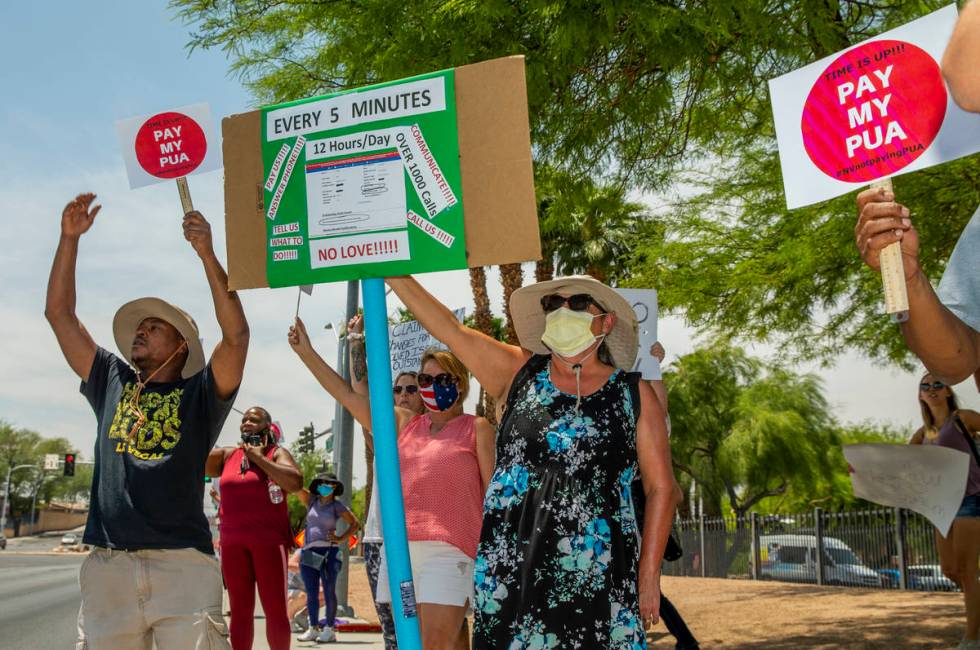No ruling yet on gig worker class-action lawsuit against DETR

Nevada’s self-employed workers hoping for a judicial remedy to their pending unemployment claims will have to wait another week or so for an answer.
The plaintiffs in a class-action lawsuit against the Department of Employment, Training and Rehabilitation were “almost but not quite” able to convince Judge Barry Breslow in a Tuesday court hearing that Nevada’s employment office should be forced to immediately pay independent contractors, self-employed people and gig workers with pending claims under the Pandemic Unemployment Assistance program.
There were 247,030 new PUA claims filed last week, of which 139,107 haven’t been paid, according to DETR data.
Breslow appointed attorney Jason Guinasso to help the Second Judicial District Court judge gather information and make a determination next week on whether and how the court should intervene in the unemployment crisis.
“No one’s being punished by the fact that a special master is being appointed here,” Breslow said in the court hearing, conducted over Zoom. “This is designed to help you help me understand and rule on this very important case.”
Guinasso, of Hutchison and Steffen Attorneys, is set to meet with DETR officials and Reno-based law firm Thierman Buck, which filed the class-action lawsuit in May on behalf of gig workers, to discuss the claims process and identify potential issues that could be addressed through a court order in the form of a writ of mandamus.
Guinasso must report his findings to the court by July 15, Breslow determined. The judge set another court hearing for 9 a.m. July 16, when he will determine whether to force DETR to pay pending claims or find other solutions to expedite claim processing.
“Where are the bottlenecks? Where are the inefficiencies that can be addressed?” Breslow asked.
Breslow expressed understanding of DETR’s situation, a state agency suddenly overwhelmed with thousands of claims for traditional unemployment insurance, PUA and other benefits programs provided under the CARES Act during the coronavirus pandemic. The agency and its employees are working hard to address claims and navigate the heavy red tape throughout the unemployment system, he said.
“But having said that, the status quo right now is unacceptable,” Breslow added, noting that thousands of gig workers and their families need help.
“I don’t want good. I don’t want great. I want heroic. That’s what the court’s expecting,” he said.
While thousands of pending claims have eligibility issues to sort through before a determination is made to pay them out, DETR suspects that a large volume of the 139,107 unpaid PUA claims could be fraudulent, Chief Economist David Schmidt said. The agency counted 64,707 PUA claims with fraud indicators, such as failed identity checks, suspicious IP addresses, out-of-country filings or suspect timing for filing.
U.S. Department of Labor guidance instructs DETR not to pay a PUA claim until someone is determined to be eligible, argued Nevada Deputy Attorney General Robert Whitney.
The attorneys representing the PUA claimants argued that the state should pay claims that appear on their face to be legitimate and later address or correct processed claims that should not have been paid, including fraudulent claims.
“The purpose of this thing is to pay,” attorney Mark Thierman said. “And we can’t have the baby thrown out with the bathwater.”
Thierman also questioned why the 45,328 PUA claims that may instead be eligible for traditional unemployment benefits aren’t automatically paid those traditional benefits.
Reached by phone Tuesday afternoon, Thierman said he was at first disappointed Breslow didn’t rule immediate payments starting Tuesday but later felt “we did pretty well.” He said the judge showed a concern for getting it right and seeing what could be done better by delaying the decision until next week.
Thierman said he hopes DETR will “self-correct” and address the plaintiffs’ concerns before next week’s judicial determination. In the meantime, he said his team will produce as evidence more than a thousand emails from PUA claimants detailing their struggles in getting benefits.
“Then it’s up to DETR to say, ‘No, no, no, they’re all wrong,’” he said.
DETR spokeswoman Rosa Mendez said the agency doesn’t comment on pending litigation.
Contact Mike Shoro at mshoro@reviewjournal.com or 702-387-5290. Follow @mike_shoro on Twitter.